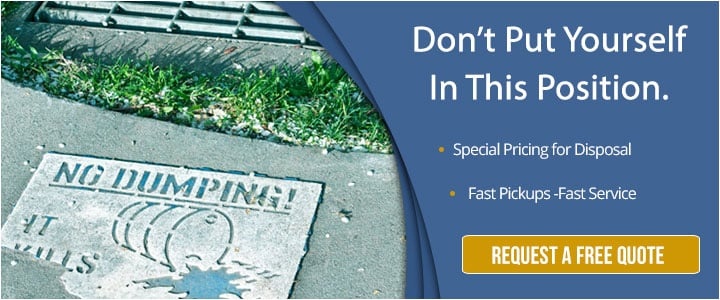Proper hazardous waste management is critically important for any company dealing with hazardous waste if they wish to remain in business and avoid the inevitable mess that comes with trying to skirt the law.
Companies like Neutrogena and the former Freedom Industries have found themselves in trouble with the law after disposing of hazardous waste illegally. While going through the process of ensuring your hazardous waste is properly disposed of may seem like an undue burden on your business, the eventual cost of not doing so could be catastrophic.
Improper hazardous waste disposal that eventually leads to environmental contamination through chemical spills and other disasters can lead to significant fines, jail time and even the closure of your business. Here are the steps you need to take to ensure you avoid these outcomes:
- Understand laws and regulations.
- Implement a comprehensive hazardous waste management plan.
- Maintain proper storage and labeling.
- Respond quickly and effectively to spills.
- Conduct regular audits and inspections.
- Partner with a certified waste disposal company.
Understand Laws And Regulations
The first step in avoiding hazardous waste and chemical spill neglect is understanding the laws that govern waste disposal in your industry. At the federal level, the Environmental Protection Agency (EPA) enforces the Resource Conservation and Recovery Act (RCRA), which outlines specific requirements for handling, storing and disposing of hazardous waste.
disposal in your industry. At the federal level, the Environmental Protection Agency (EPA) enforces the Resource Conservation and Recovery Act (RCRA), which outlines specific requirements for handling, storing and disposing of hazardous waste.
States often have their own regulations that complement or go beyond federal laws, so it's essential to stay informed about both. In California, the state’s Department of Toxic Substances Control (DTSC) oversees hazardous waste disposal, ensuring that businesses adhere to local laws.
Companies must also ensure they comply with local regulations that address chemical spill prevention, spill response and cleanup. Familiarize yourself with the definitions of hazardous materials and waste to ensure that your business is correctly categorizing and managing these substances.
Implement A Comprehensive Hazardous Waste Management Plan
Once you understand the laws, the next step is implementing a comprehensive hazardous waste management plan. This plan should include protocols for identifying, labeling, storing and disposing of hazardous materials properly. It should also include emergency response procedures in the event of a chemical spill.
The plan should designate specific personnel responsible for waste management duties and ensure they are trained regularly on the latest procedures and regulatory updates. Businesses should also document every step of their hazardous waste handling and disposal processes. This documentation can serve as proof of compliance in the event of an inspection or audit.
Maintain Proper Storage And Labeling
The way hazardous waste is stored plays a significant role in preventing chemical spills and environmental contamination. Waste should be stored in properly labeled containers that meet the standards outlined by OSHA, EPA and other regulatory agencies.
contamination. Waste should be stored in properly labeled containers that meet the standards outlined by OSHA, EPA and other regulatory agencies.
Containers should be clearly marked with the type of waste, the date it was generated and any necessary safety warnings.
It’s important to store hazardous waste in areas that are secure, well-ventilated and designed to contain spills. Spill containment systems, such as secondary containment areas or bundling, should be used to prevent waste from leaking into the environment. Routine inspections should be conducted to ensure that containers are in good condition and that safety protocols are being followed.
Respond Quickly And Effectively To Spills
Despite all precautions, accidents can still happen. Having a well-thought-out spill response plan in place is crucial for limiting damage. This plan should outline steps for containing the hazardous waste spill, protecting personnel and the environment, and notifying the appropriate authorities.
Employees should be trained on how to respond to hazardous material spills, including how to use spill containment materials and personal protective equipment (PPE). In some cases, companies may be required to report certain types of spills to local, state, or federal authorities. Failure to notify the appropriate agencies can result in significant fines and legal penalties.
Conduct Regular Audits And Inspections
To ensure that your hazardous waste management practices remain compliant with regulations, conduct regular audits and inspections. These should include internal reviews of your waste management plan, employee training, storage areas and disposal processes.
audits and inspections. These should include internal reviews of your waste management plan, employee training, storage areas and disposal processes.
Audits can help identify areas where improvements may be needed and reduce the risk of non-compliance.
Companies should also schedule periodic third-party audits by professionals who can assess your hazardous waste management program and ensure it meets all legal and environmental standards. These audits can serve as a proactive way to identify potential issues before they become legal or environmental problems.
Partner with a Certified Waste Disposal Company
One of the best ways to avoid legal trouble is to work with a licensed hazardous waste disposal company. Hazardous waste disposal companies are experienced in managing hazardous waste in compliance with environmental regulations. They will ensure your waste is properly transported, treated, and disposed of in accordance with the law.
It's crucial to verify the credentials of any waste disposal company you choose to partner with. Ensure that they are certified, licensed and knowledgeable about the specific types of waste your business generates. A reputable company will also provide you with the necessary documentation, such as manifests and certificates of disposal, to prove that the waste has been handled correctly.
Hazardous waste disposal and chemical spill management are not areas where businesses can afford to cut corners. The consequences of neglecting proper procedures can lead to costly fines, legal action and environmental disasters that could endanger both the community and your business’s future.
Remember, the cost of compliance is far less than the penalties for non-compliance—both financially and to your company’s reputation.


Comment